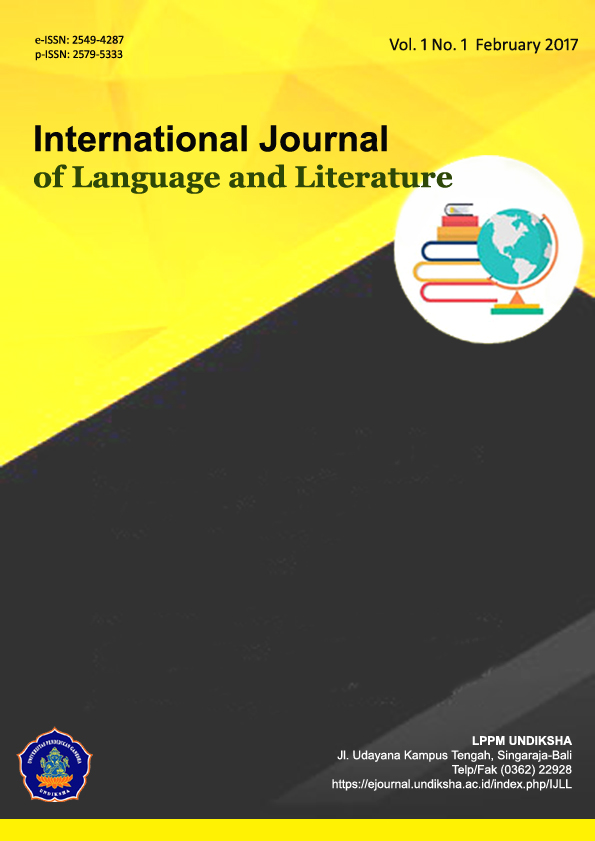ANANLYSIS OF SIXTH SEMESTER STUDENTS’ PERCEPTION TOWARD MICROTEACHING IN THE CONTEXT CURRICULUM 2013 IN ENGLISH LANGUAGE EDUCATION
DOI:
https://doi.org/10.23887/ijll.v2i4.16354Abstract
This study aimed to describe the sixth semester students' perception toward microteaching in the context of curriculum 2013 in English Language Education, Undiksha in academic years 2018/2019.This research used mix method design. the subject of this research was 87 sixth semester students and the object of this research was students' perception toward microteaching in the context of curriculum 2013. The data obtained through questioner and interview sheet. The result of data showed that students gave positive responds to the questionnaire about sixth semester students’ perception toward microteaching subject in the context of curriculum 2013. It was proven from the calculation of the score was 70% which means it is above 60%. It means that students gave positive responds to the questionnaire about sixth semester students’ perception toward microteaching subject in the context of curriculum 2013.
Keywords: perception, microteaching, curriculum 2013.
References
Adediwura, Bada Tayo.(2007). Perception of Teacher Knowledge, Attitude, and Teaching Skills as Predictor of Academic Performance in Nigerian Secondary Schools. Educational Research and Review Vol. 2 (7), July, 2007. Pp: 165-171. Retrieved from: http://www.iosrjournals.org/iosr-jrme/papers/Vol-2%20Issue-5/D0251929.pdf?id=6742.
A. A., & Tayo, B. (2007). Perception of teachers' knowledge, attitude and teaching skills as predictor of academic performance in Nigerian secondary schools. Educational Research and Reviews, 2(7), 165. Retrieved from:http://www.iosrjournals.org/iosr-jrme/papers/Vol-2%20Issue-5/D0251929.pdf?id=6742.
Ahmad, D. (2014). Understanding the 2013 Curriculum of English Teaching through the Teachers‟ and Policymakers‟ Perspectives. International Journal of Enhanced Research in Educational Development (IJERED), 2(4), 6-15.
Ahid, N. (2006). Konsep dan Teori Kurikulum dalam Dunia Pendidikan. ISLAMICA: Jurnal Studi Keislaman, 1(1), 12-29.
Al Darwish, S., & Sadeqi, A. (2016). Microteaching impact on Student Teacher's Performance: A Case Study from Kuwait. Journal of Education and Training Studies, 4(8), 126-134.
Allen, D. W., & Cooper, J. M. (1970). Microteaching. PREP-17.
Arismayanti, N. M., Padmadewi, N. N., & Hermawan, G. S. (2016). Persepsi Mahasiswa Semester VII Tentang Mata Kuliah Microteaching Jurusan Pendidikan Bahasa Jepang Undiksha dalam Konteks Kurikulum 2013 Tahun Ajaran 2015/2016. Jurnal Jurusan Pendidikan Bahasa Jepang, 5(2).
Ary, D., Jacobs, L. C., Irvine, C. K. S., & Walker, D. (2010). Introduction to Research in Education. Canada: Nelson Education, Ltd.
Creswell, J. W. (2014). Research design: pendekatan kualitatif, kuantitatif, dan mixed. Yogjakarta: PT Pustaka Pelajar
Demirkasımoğlu, N. (2010). Defining “Teacher Professionalism” from different perspectives. Procedia-Social and Behavioral Sciences, 9, 2047-2051.
Diehl, P. L., & Gay, L. R. (1992). Research methods for business and management. New York: McMillan.
Dwinata, E. (2017). Language and Perception. BRIGHT: Journal of English Language Teaching, Linguistics and Literature, 1(1).
English Teacher Education Program. Journal of Ismail, S. A. A. (2011). Student Teachers' Microteaching Experiences in a Preservice Language Teaching & Research, 2(5).
Ina, M. (2012). Persepsi Siswa Terhadap Implementasi Sistem Manajemen Mutu Iso 9001: 2008di SMK Muhammadiyah 3 Yogyakarta (Doctoral dissertation, UNIVERSITAS NEGERI YOGYAKARTA).
Ismail, S. A. A. (2011). Student teachers' microteaching experiences in a preservice English teacher education program. Journal of Language Teaching and Research, 2(5), 1043.
Kant, R. (2017). Microteaching: Attitude and Perception. 58386- 58388
Maba, W., & Mantra, I. B. N. (2018). The primary school teachers’ competence in implementing the 2013 curriculum. In SHS Web of Conferences (Vol. 42, p. 00035). EDP Sciences.
Mahmud, I., & Rawshon, S. (2013). Micro Teaching to Improve Teaching Method: An Analysis on Students’ Perspectives. OSR Journal of Research & Method in Education (IOSR-JRME), 1(4).
Marini, N. L. S., Padmadewi, N. N., & Hermawan, G. S. (2016). Persepsi Dosen Jurusan Pendidikan Bahasa Jepang Tentang Pelaksanaan Mata Kuliah Microteaching dalam Konteks Kurikulum 2013. Jurnal Pendidikan Bahasa Jepang Undiksha, 5(2).
Ogeyik, M. C. (2009). Attitudes of the student teachers in English language teaching programs towards microteaching technique. English Language Teaching, 2(3), 205.
Pemerintah Republik Indonesia. 2012. Kerangka Dasar Dan Struktur Kurikulum Sekolah Menengah Atas/Madrasah Aliyah.
Punia, V., Miglani, P., & Singh, S. P. (2016). Perception of Pupil-Teachers' Regarding Micro-Teaching Sessions. World Scientific News, 26, 69.
Sugiyono. (2015). Metode Penelitian Pendidikan (Pendekatan Kuantitatif,
Kualitatif, dan R&D). Bandung: Alfabeta. 177-393
Sukirman, D. (2012). Pembelajaran Micro Teaching. Jakarta: Direktorat Jendral Pendidikan Islam Kementerian Agama.
Suwarna, d. (2006). Pengajaran Mikro, Pendekatan Praktis Menyiapkan Pendidik Profesional. Yogyakarta: Tiara Wacana. 2-8
Walgito, Bimo. (2003). Pengantar Psikologi Umum. Yogyakarta: Andi.
Wang, Y. (2009). On the Cognitive Processes of Human Perception with Emotions, Motivations, and Attitudes. In Novel Approaches in Cognitive Informatics and Natural Intelligence(pp. 65-77). IGI Global.
Zaim, M. (2017). Implementing scientific approach to teach English at senior high school in Indonesia. Asian Social Science, 13(2), 33.
Downloads
Published
How to Cite
Issue
Section
License
IJLL Journal provides immediate open access to its content on the principle that making research freely available to the public to supports a greater global exchange of knowledge.

This work is licensed under a Creative Commons Attribution-ShareAlike 4.0 International License







